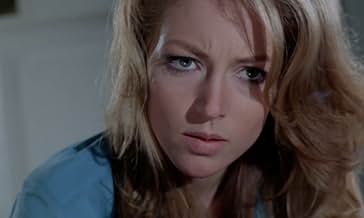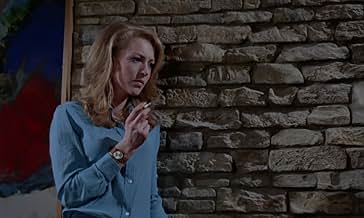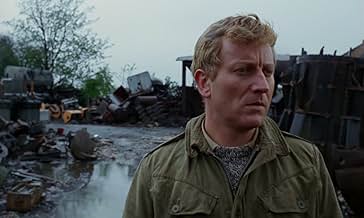Robbery
- 1967
- 1 घं 50 मि
IMDb रेटिंग
6.9/10
2.3 हज़ार
आपकी रेटिंग
अपनी भाषा में प्लॉट जोड़ेंA group of British criminals plan the robbery of the Royal Mail train on the Glasgow-London route.A group of British criminals plan the robbery of the Royal Mail train on the Glasgow-London route.A group of British criminals plan the robbery of the Royal Mail train on the Glasgow-London route.
- पुरस्कार
- कुल 1 जीत
Patrick Jordan
- Freddy
- (as Patrick Jordon)
Kenneth Farrington
- Seventh Robber
- (as Ken Farrington)
Roger Booth
- Detective
- (बिना क्रेडिट के)
Ron Charles
- Seaman
- (बिना क्रेडिट के)
फ़ीचर्ड समीक्षाएं
Robbery is for me a semi-documentary / thriller based on the Great Train Robbery of 1963. The location of the actual heist, on a bridge crossing a country lane bears similarity to the real robbery. The film moves around much of 60s London in the first part, during which time the gang are robbing to gain funds, plus planning the main robbery.
The gangs' meeting on the terraces during a Leyton Orient match is well screened; Stanley Baker becomes so heated during their discussion he misses a great run and shot against the crossbar shown from the pitch!
As for the central characters, Stanley Baker superbly plays "Mr Big" Paul Clifton, who is a character that the viewer never quite gets to know the limits. For example he tells the gang "we don't need guns, the police don't carry them"; later his wife finds his revolver at home, when quizzed he says "the gun is because I not going back inside (prison)".
William Marlowe cleverly plays Clifton's "number 2" Dave Aitken, who is clearly "nice cop" versus Clifton's "bad cop" in terms of running the gang.
As with the real train robbery, the gang make a successful robbery; however mistakes made during hideway contribute to their eventual capture. Not least when their contact who "cleans up" the getaway vehicles is apprehended at an airport leaving the UK with about £50K stuffed up his coat - his capture enables the police to set up a successful trap for the rest of the gang.
The ending of the film is probably a slight movement forward from many 1950s movies where the gang are all caught - the ending to Robbery slightly leaves the viewer guessing. This is a film for enthusiasts of films of past years, who may like to spot London landmarks.
The gangs' meeting on the terraces during a Leyton Orient match is well screened; Stanley Baker becomes so heated during their discussion he misses a great run and shot against the crossbar shown from the pitch!
As for the central characters, Stanley Baker superbly plays "Mr Big" Paul Clifton, who is a character that the viewer never quite gets to know the limits. For example he tells the gang "we don't need guns, the police don't carry them"; later his wife finds his revolver at home, when quizzed he says "the gun is because I not going back inside (prison)".
William Marlowe cleverly plays Clifton's "number 2" Dave Aitken, who is clearly "nice cop" versus Clifton's "bad cop" in terms of running the gang.
As with the real train robbery, the gang make a successful robbery; however mistakes made during hideway contribute to their eventual capture. Not least when their contact who "cleans up" the getaway vehicles is apprehended at an airport leaving the UK with about £50K stuffed up his coat - his capture enables the police to set up a successful trap for the rest of the gang.
The ending of the film is probably a slight movement forward from many 1950s movies where the gang are all caught - the ending to Robbery slightly leaves the viewer guessing. This is a film for enthusiasts of films of past years, who may like to spot London landmarks.
This movie is well made, with a typical trade mark approach by the crime picture craftsman Peter Yates was. There's no big bang, no unnecessary violence, just the pace that tells the story. This method Yates used successfully in his Hollywood years building up a plot without too much distraction from standard story fillers, which produced great films such as "Bullitt" and "The Friends of Eddie Coyle". In this one Yates gives the audience just enough to paint a picture of a big time robbery, with minimal character development but enough to serve the purpose.
A must see for the fans of this classic director, not great but rather good crime movie that they don't make any more.
A must see for the fans of this classic director, not great but rather good crime movie that they don't make any more.
Best known as the little obscure crime film that gave English director Peter Yates his big game-changing opportunity to make BULLITT stateside, after Steve McQueen had witnessed the rudimentary car chase sequence from ROBBERY, an extremely sparse, deliberately uncaring British Neo Noir Heist-Thriller...
And it's not just the chase that Yates carried over to the McQueen classic but the meticulous and metronomic moments leading up to it...
Starring the always tough/ultra square-jawed Stanley Baker but only because he's in charge, ROBBERY makes pretty much equal use of the male leads...
Including James Booth as the trailing cop, William Marlowe as Baker's strong-silent second, Barry Forster as his strong-silent third while Frank Finlay, as a meek/geek though crooked banker too-easily broken out of prison, is the most vulnerable and sympathetic...
Yet there's very little sympathy for these particular devils, whose only flaw is how long and tediously methodical it takes for the actual train heist (inspired by The Great Train Robbery) to go down... the director not always considering an audience but, like real life crimes - and even the McQueen ultra-realistic police-procedure about the other side of the law - Yates showcases the slowburn reality like being right there, for better or worse since it's not always extremely exciting, and that's the point...
Just don't let the casting of beautiful poster-perfect Joanne Pettit fool you. ROBBERY cares neither about romance or the human condition.
And it's not just the chase that Yates carried over to the McQueen classic but the meticulous and metronomic moments leading up to it...
Starring the always tough/ultra square-jawed Stanley Baker but only because he's in charge, ROBBERY makes pretty much equal use of the male leads...
Including James Booth as the trailing cop, William Marlowe as Baker's strong-silent second, Barry Forster as his strong-silent third while Frank Finlay, as a meek/geek though crooked banker too-easily broken out of prison, is the most vulnerable and sympathetic...
Yet there's very little sympathy for these particular devils, whose only flaw is how long and tediously methodical it takes for the actual train heist (inspired by The Great Train Robbery) to go down... the director not always considering an audience but, like real life crimes - and even the McQueen ultra-realistic police-procedure about the other side of the law - Yates showcases the slowburn reality like being right there, for better or worse since it's not always extremely exciting, and that's the point...
Just don't let the casting of beautiful poster-perfect Joanne Pettit fool you. ROBBERY cares neither about romance or the human condition.
The terseness of the one-word title perfectly fits the low-keyed demeanour of this laconic heist movie that just a couple of years earlier would have been shot in black & white but now had to be in colour (but with results so pleasing to the eye I'm not complaining).
The initial car chase promptly brought Peter Yates to America to repeat the trick but seeing it staged in the narrow streets of London rather than in San Francisco in 'Bullitt' (which could have been built for the job) the results were thus ten times more harrowing; and the film that follows is far more coherent.
The initial car chase promptly brought Peter Yates to America to repeat the trick but seeing it staged in the narrow streets of London rather than in San Francisco in 'Bullitt' (which could have been built for the job) the results were thus ten times more harrowing; and the film that follows is far more coherent.
British Peter Yates drove race cars before becoming a director and turning out some pedestrian work and a couple of respectable films, including this one and "Bullitt." Steve McQueen, another racing aficionado, having seen the spectacular car chase through the streets of London in this film, invited Yates to direct him in "Bullitt" the following year, and there is a certain concordance between the two. "Bullitt" (1968) is superior. The interrelationships are more subtle, the musical score more apt. The score in "Robbery" shrieks "generic thriller" and lacks anything like the sophistication of the flute trio in San Francisco's chic Coffee Cantata. And if the car chase in "Robbery" is thrilling -- and it is -- the high speed pursuit in "Bullitt" provides a touchstone for all the car chases that followed, from "The Seven Ups" to "The French Connection." There was never anything like it before.
Basically, "Robbery" has Stanley Baker in charge of one of those gangs consisting of specialists, one expert in electronics, another in laundering, another who knows how to be a locomotive engineer, and so forth. The heist of more than three million pounds from the Royal Mail train is tense, engaging, and a little confusing. The confusion is compensated for by the many times we see references to "Royal Mail," which sounds infinitely better than "U. S. Postal Service." "Royal Mail." It doth roll trippingly from the tongue.
No guns are displayed or used, in contrast to "Bullitt", and even in the later film there are only two brief scenes involving gunplay. The fact is that guns aren't always necessary in robberies like the one described here. Imagine, two freaky looking dudes wearing black ski masks and threatening you with crowbars tell you to drive a locomotive at 20 miles per hour, and you're a balding, near-sighted, middle-aged man. Are you going to drive that locomotive at the speed requested? You bet you are. "No guns," orders Stanley Baker. "They don't use them so we won't either." On the other hand, "Bullitt" was made in America for an American audience and the final shot is of a .38 caliber police revolver in its holster, wrapped in its shoulder harness, lying on the bathroom sink, all coiled up like a rattlesnake.
"Robbery" is a caper movie. The police are always just one step behind the gang. The gang's hideout is at a now deserted and dilapidated base called RAF Gravesley, a bomber base that once accommodated Halifaxes and Mosquitoes. It's an eerie feeling to be in a once-populated and now empty community.
I had that experience at Fort Hancock, established during the Revolutionary War to guard New York harbor from the British. It was closed during the Cold War and all its personnel departed except for a handful of Coast Guardsmen, with whom I stayed for a summer. All the empty buildings were unlocked. The hospital staff had left its microscope slides carefully packed in drawers. There was the occasional pile of 20 mm. rounds, still intact. I had a similar feeling watching the scenes shot at RAF Gravesley. It was like being in an episode of The Twilight Zone.
Overall, nice job, and an entry for Peter Yates into the Big Money of Hollywood.
Basically, "Robbery" has Stanley Baker in charge of one of those gangs consisting of specialists, one expert in electronics, another in laundering, another who knows how to be a locomotive engineer, and so forth. The heist of more than three million pounds from the Royal Mail train is tense, engaging, and a little confusing. The confusion is compensated for by the many times we see references to "Royal Mail," which sounds infinitely better than "U. S. Postal Service." "Royal Mail." It doth roll trippingly from the tongue.
No guns are displayed or used, in contrast to "Bullitt", and even in the later film there are only two brief scenes involving gunplay. The fact is that guns aren't always necessary in robberies like the one described here. Imagine, two freaky looking dudes wearing black ski masks and threatening you with crowbars tell you to drive a locomotive at 20 miles per hour, and you're a balding, near-sighted, middle-aged man. Are you going to drive that locomotive at the speed requested? You bet you are. "No guns," orders Stanley Baker. "They don't use them so we won't either." On the other hand, "Bullitt" was made in America for an American audience and the final shot is of a .38 caliber police revolver in its holster, wrapped in its shoulder harness, lying on the bathroom sink, all coiled up like a rattlesnake.
"Robbery" is a caper movie. The police are always just one step behind the gang. The gang's hideout is at a now deserted and dilapidated base called RAF Gravesley, a bomber base that once accommodated Halifaxes and Mosquitoes. It's an eerie feeling to be in a once-populated and now empty community.
I had that experience at Fort Hancock, established during the Revolutionary War to guard New York harbor from the British. It was closed during the Cold War and all its personnel departed except for a handful of Coast Guardsmen, with whom I stayed for a summer. All the empty buildings were unlocked. The hospital staff had left its microscope slides carefully packed in drawers. There was the occasional pile of 20 mm. rounds, still intact. I had a similar feeling watching the scenes shot at RAF Gravesley. It was like being in an episode of The Twilight Zone.
Overall, nice job, and an entry for Peter Yates into the Big Money of Hollywood.
क्या आपको पता है
- ट्रिवियाIt was the realistic car chase through the streets of London in this picture, that led to director Peter Yates doing another car chase in San Francisco a year later. Steve McQueen personally wanted Yates for what turned out to be his highest grossing film बुलिट (1968).
- गूफ़When the traffic warden puts the gas canister in the car, a white cable can be seen draping from the inside of the door and this is seen to be connected to the device as he removes it from his bag. There is no sign of the cable in the following close-up shot from his point of view.
- भाव
Paul Clifton: We're talking about millions of pounds now. We're talking about road blocks, car searches, house raids, shakedowns. They'll know who pulled the job. Without the money, they can't prove anything.
- कनेक्शनFeatured in Film Review: Film Review (1967)
टॉप पसंद
रेटिंग देने के लिए साइन-इन करें और वैयक्तिकृत सुझावों के लिए वॉचलिस्ट करें
विवरण
- रिलीज़ की तारीख़
- कंट्री ऑफ़ ओरिजिन
- भाषा
- इस रूप में भी जाना जाता है
- Überfall
- फ़िल्माने की जगहें
- Leyton Stadium, Brisbane Road, Leyton, लंदन, इंग्लैंड, यूनाइटेड किंगडम(Paul Clifton plans the train robbery with Frank, Dave, Ben and Don during a football match)
- उत्पादन कंपनियां
- IMDbPro पर और कंपनी क्रेडिट देखें
इस पेज में योगदान दें
किसी बदलाव का सुझाव दें या अनुपलब्ध कॉन्टेंट जोड़ें




































